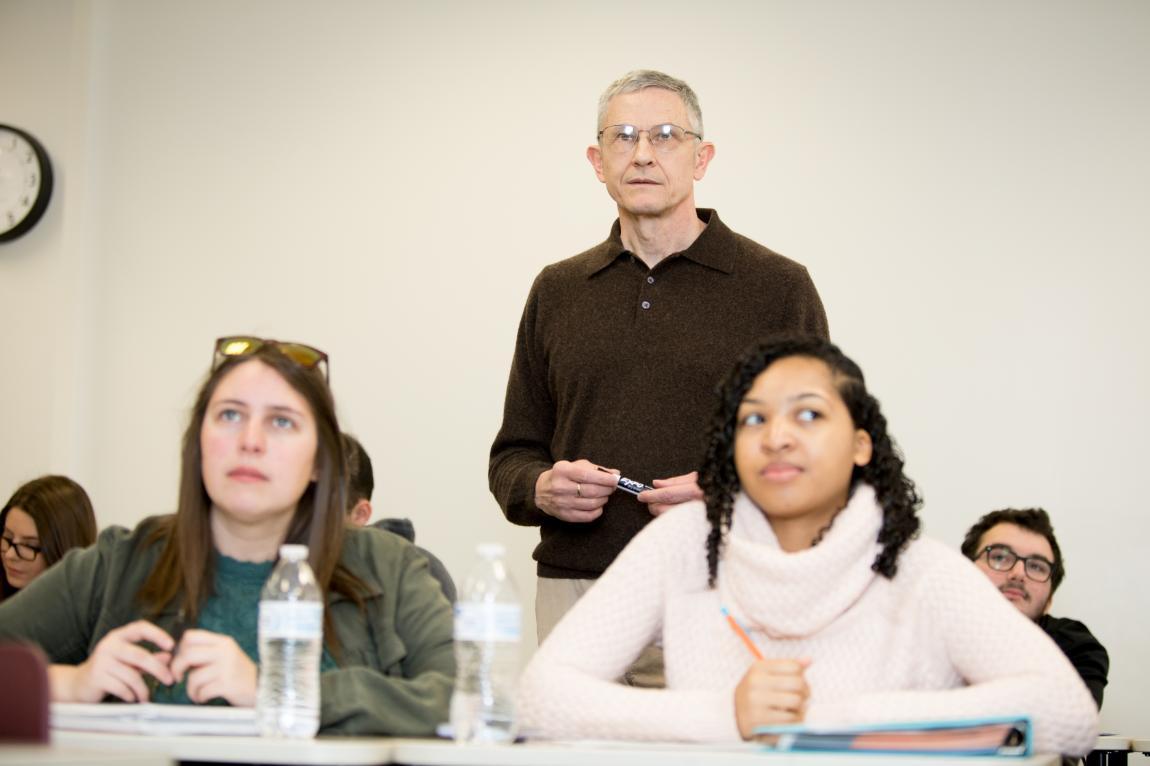

After nearly forty years, Latin is back at Longwood. A staple of liberal arts curricula across the world, Latin provides not only a deeper understanding of the English language, but a rigorous addition to the course catalogue for students who studied it in high school to continue at Longwood and complete the language requirement for graduation.
The face of the new Latin classes is Dr. McRae Amoss, professor of French and 19th century French culture. Amoss, a 27-year veteran of the Longwood English and Modern Languages department, is embarking on an uncommon challenge in higher education circles--adding another element to his well-established repertoire of classes and taking on an enormous challenge.
Having a working knowledge of the language and the roots and meanings of words can make someone a much more effective and eloquent communicator, no matter their profession.
Dr. McRae Amoss Tweet This
In fact, leading the new Latin program at Longwood was not on Amoss’s radar even several years ago. But when the opportunity presented itself to offer courses to incoming Lancers who have studied Latin in their high school careers, Amoss jumped at the chance to rekindle the spark he felt as an undergraduate student at Georgia State University more than three decades ago.
So, Latin is back at Longwood.
In Fall 2018, we will offer our first Latin course in about four decades. We aren’t establishing a Latin or Classics major, the purpose of this initiative is to permit students who have had Latin in high school to continue with the language and complete requirements for graduation here at Longwood. Once we get this off the ground, we’ll offer two courses per academic year.
How many students are we talking about?
There are still a good many students in Virginia, maybe more than in other states, who study Latin in high school, and it’s been an impediment when they enroll here because they functionally have to start language over again. There’s been the option of taking a Latin course at Hampden-Sydney or somewhere else, but this makes those classes available right here at Longwood. As we were going through the process of implementing the new core curriculum, we recognized the opportunity to explore whether we could offer Latin classes on this scale.
Alumni are very proud that we are bringing back courses many of them remember from their time on campus.
Dr. McRae Amoss Tweet This
Do you think today’s students will find that same enthusiasm and significance in studying Latin?
There are plenty of ways an understanding of Latin is useful--from professions that use Latin words heavily to a better understanding of our own language. At least half of the English vocabulary, after all, comes from Latin either directly or indirectly. So having a working knowledge of the language and the roots and meanings of words can make someone a much more effective and eloquent communicator, no matter their profession.
How are students and alumni reacting to the news?
So far the response has been overwhelmingly positive. I’ve spoken with several students who took Latin in high school and liked it, and would like to continue along that course of study. And alumni are very proud that we are bringing back courses many of them remember from their time on campus.
You’ve been at Longwood for 27 years. What made you decide to take on something completely new?
I really fell in love with Latin and Greek during my own undergraduate studies at Georgia State and then at the University of Virginia for graduate work. My master’s degree focused on renaissance literature and to study that properly you almost have to have a working knowledge of Latin and Greek because people were using it at the time. I have such good memories of those classes that I sort of jumped at the chance to get back into something that I liked very much. Personally, it gives me the opportunity to get back into a language that I had advanced to a certain level in.
What has been the hardest part of revisiting a language after 30 years?
Well, I’ve been around it in bits and pieces in the interim, but the rebuilding the vocabulary necessary to be an effective teacher will be my priority this semester and over the summer. I’m really looking forward to that work, however, because it was the vocabulary that started me down this journey in the first place.
How so?
When I reached a certain level of studying literature, especially Renaissance literature, I found that a lot of texts had untranslated French or Latin quotes or passages and I simply wanted to know what they said. My whole motivation for studying languages in the first place was because I had a deep desire to read literature and philosophy written in those languages without having to go to translation.
I remember the moment the light went off in my head in Latin class. We were reading Pliny the Younger’s letters describing the eruption of Vesuvius in 79 AD, and it was so much fun. I was simply thrilled to be reading the stuff that he had written in the moment, in the language that he wrote it in. You could easily find an English translation but to me it just wouldn’t be the same.

